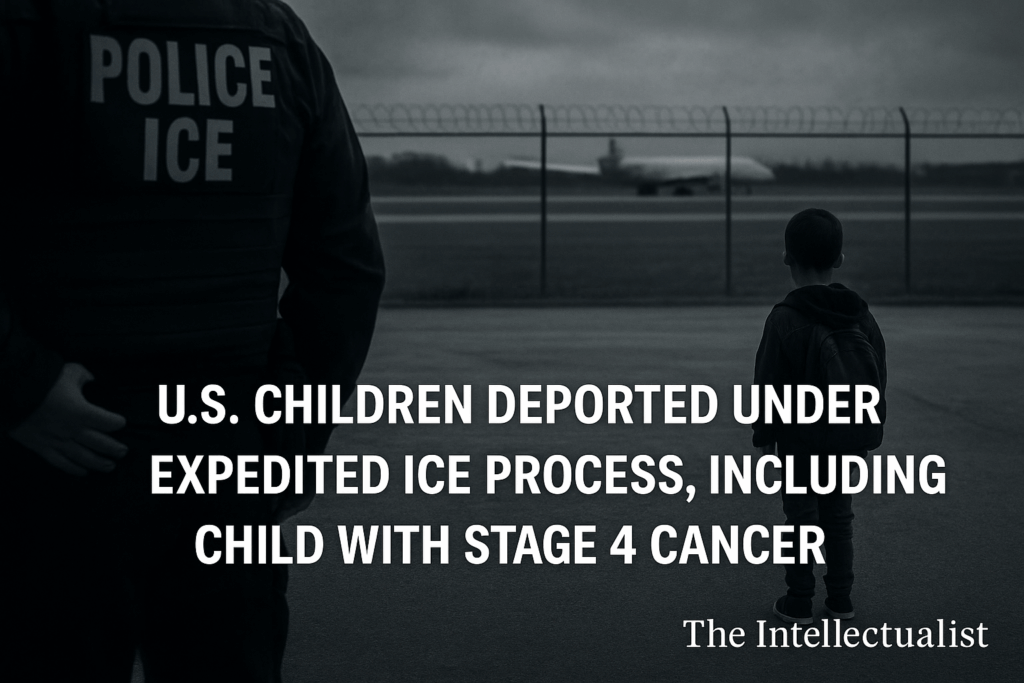U.S. Children Deported Under Expedited ICE Process, Including Child With Stage 4 Cancer

In a series of deportations that have ignited constitutional concerns, three U.S. citizen children — aged 2, 4, and 7 — were deported alongside their mothers by U.S. Immigration and Customs Enforcement (ICE) in the early hours of Friday morning. The incident, confirmed by The Washington Post and multiple independent sources, highlights renewed anxieties about the Trump administration’s use of expedited deportation procedures that critics argue violate both citizens’ and noncitizens’ due process rights.
The families, who had been participating in ICE’s Intensive Supervision Appearance Program, were attending routine check-ins in New Orleans earlier this week. This program traditionally allows individuals undergoing immigration proceedings to remain in their communities while awaiting court outcomes. Instead, during their latest check-ins, both families were taken into custody without prior notice, transported to an ICE detention facility in Alexandria, Louisiana — a three-hour drive from New Orleans — and subsequently placed on a deportation flight to Honduras.
Attorneys representing the families reported that they were denied the opportunity to communicate with family members or legal counsel before removal. Most concerning to observers is that one of the deported children — a four-year-old U.S. citizen battling Stage 4 cancer — was deported without access to necessary medications or the ability to consult with their oncologists. Legal advocates have emphasized that the child’s medical needs were known to ICE officers at the time of removal.
Civil rights organizations, including the American Civil Liberties Union (ACLU), have strongly condemned the deportations, labeling them as “blatant constitutional violations” and demanding immediate federal investigations. “I don’t know how much more clear a violation of constitutional protections there can be,” said one attorney representing the deported families, echoing widespread alarm within the legal community.
The Trump administration’s push for accelerated deportations has been controversial since its inception. Changes to ICE’s internal protocols have increasingly empowered officers to bypass traditional immigration court proceedings under “expedited removal” rules. Critics argue that these practices undermine the fundamental legal principle of due process — particularly when they ensnare U.S. citizens.
In response to the incident, U.S. District Judge Terry Doughty has scheduled an emergency hearing to investigate whether the expedited removals violated federal law and constitutional protections. Legal experts note that under longstanding Supreme Court precedent, U.S. citizens — regardless of their parentage — are entitled to full due process protections, and the deportation of citizens without judicial review could constitute a grave constitutional breach.
The Department of Homeland Security has not yet issued a formal statement regarding the deportations but sources inside the department suggested the administration is likely to argue that expedited removals are permissible under national security and immigration control imperatives.
The incident has intensified scrutiny of the Trump administration’s broader immigration enforcement practices during its second term. Under the current approach, the administration has prioritized speed over traditional procedural safeguards, arguing that the immigration system has been “weaponized against national sovereignty.” Opponents counter that in the pursuit of speed, constitutional norms are being systematically dismantled.
In Congress, Democratic leaders quickly condemned the deportations. Senate Majority Leader Chuck Schumer called them “an attack on the very idea of American citizenship” and promised immediate legislative inquiries. Several House Democrats are reportedly preparing emergency oversight hearings and a potential challenge to expedited deportation authorities.
Beyond immediate legal challenges, the deportation of U.S. citizen children without due process marks a profound moment of constitutional anxiety in American political life. As one legal scholar put it, “When a country can exile its own citizens without warning, it ceases to be governed by law, and becomes governed by whim.”
The families deported to Honduras are reportedly attempting to return to the United States, although re-entry proceedings for deported U.S. citizens are complex and may require prolonged legal battles. Meanwhile, the four-year-old cancer patient remains without access to their established oncological care team, heightening fears of immediate medical jeopardy.
The cases underscore a critical question looming over American democracy in 2025: whether citizenship itself remains an unassailable right, or merely another status subject to political convenience.

